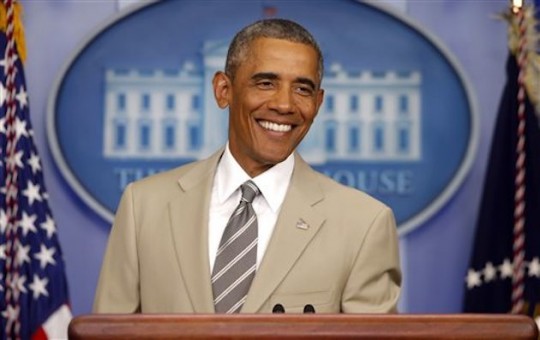One of the more curious features of the Obama worldview is the belief that, a few beheadings here and there notwithstanding, everything out there in the world is going pretty well.
On Wednesday, the president’s remarks on the Islamic State painted a generally rosy picture of the international situation and the American role therein. America is "safer" today as a result of military’s execution of the president’s policies, the president said. In Europe, we have "rallied the world against Russian aggression." In the Middle East, it was "America that helped remove and destroy Syria’s declared chemical weapons so that they can’t post a threat to the Syrian people or the world again." In Afghanistan, "our combat mission will end later this year."
The belief that things are basically fine does not belong only to the president, but also to his supporters and to the "realist" and nonintervention community. For this wing of American politics, the true threats to American democracy are here at home, in the form of economic inequality, racism and associated ills, and a hawkish foreign policy. Note how, in his Wednesday speech, the president mentioned the 2008 financial panic in almost the same breath as he did 9/11. For him and his supporters, it is of equal or—if they are speaking privately—greater importance than al Qaeda’s attacks on the United States. Obama’s foreign policy—with its paper-thin veneer of liberal internationalist rhetoric obscuring an unsubtle preference for America’s global withdrawal—is to leave the world’s problems to international institutions so we can get down to the more important task of nation-building here at home.
As Obama told donors at a $32,400-a-plate fundraiser earlier this year, "the truth of he matter is, is that the world has always been messy. In part, we’re just noticing now because of social media and our capacity to see in intimate detail the hardships that people are going through."
And yet the very issues that Obama cites as evidence of his successes indicate that, rather than getting safer, the world is getting more dangerous—as dangerous as any time since the Cold War.
In Europe, if America has "rallied" opposition to Russia, it sure doesn’t seem to be working. After he tired of allowing the Ukrainians to score battlefield victories against Russian-backed separatists in the eastern part of their country, Putin invaded with Russian troops, opened a southern front, and drove towards the Sea of Azov. The Ukrainian president was forced to ask for a ceasefire. Some sort of permanent fragmentation or Finlandization of Ukraine seems inevitable.
Meanwhile, in the Baltic states, Russian security agents infiltrated Estonia and kidnapped an Estonian counter-intelligence officer, who is currently being held captive in Moscow. Just down the coast, Russia is demanding that the Lithuanian state prosecute Lithuanian nationals who declined to serve in the Russian army in the early 1990s. Like the nuclear-launch rehearsals targeting American on which Bill Gertz reported here at the Washington Free Beacon, these actions seemed to have been timed to emphasize to those gathered at the NATO summit in Wales that Russia is a force to be reckoned with.
In the Middle East, our policies have allowed the Islamic State to come to fore, and despite the self-congratulatory nature of the president’s references to Syrian chemical weapons, even his own UN ambassador, Samantha Powers, doesn’t seem to believe that the Syrians have gotten rid of them. By the way, Assad is still in power, and still killing civilians.
In Afghanistan, the Taliban are coming back as we withdraw.
The president didn’t mention Iran on Wednesday. They are still pursuing nuclear weapons, and rather than helping us stop them—as the Obama administration tried for years to get them to do—Adam Kredo reports today that the Russians are cooperating ever more closely with Tehran on nuclear matters. Thus, strategically, the menace of a nuclear-armed Iranian-Shiite axis stretching from the Mediterranean to the border of Afghanistan, allied with a resurgent Russian empire, is nearly a reality.
And of course there’s China’s aggressiveness in the Pacific. How’s that pivot going?
Obama’s instinctive aversion to strong American action abroad makes the world more dangerous by emboldening our foes who, the fervent hopes of liberals notwithstanding, do not want what we want: a liberal world order.
